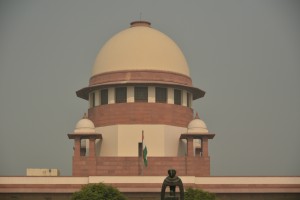Supreme Court: Showing concern over the presence of liquor vends on national and state highways across the country, the 3-judge bench of J.S. Khehar, CJ and Dr. D.Y. Chandrachud and L. NAgeswara Rao, JJ said that where a balance has to be drawn between protection of public health and safety and the need to protect road users from the menace of drunken driving and the trade in liquor, the interests of the latter must be subordinate to the former as drunken driving is a potent source of fatalities and injuries in road accidents.
Stating that a distance of 100 metres with reference to the highway is not adequate to ensure that users of the highway do not seek access to the sale of liquor in close proximity to the highway, the Court had, on 15.12.2016, directed that the liquor vends are not visible or directly accessible from the highway within the stipulated distance of 500 metres from the outer edge of the highway or the service lane. However, the Court laid down additional directions in respect of the following different areas where the blanket rule of ‘500 metres distance’ was not possible to be made applicable:
- Local bodies with a population of less than 20,000 people: Considering the fact the requirement of maintaining a distance of 500 metres from the outer edge of the highway or service lane may result in a situation where the entire local area may fall within the prohibited distance as a state highway is the main thoroughfare of such area, the bench said that the , the prohibited distance in such areas should in our view be restricted to 220 metres from the outer edge of the national or state highway or of a service lane along the highway. However, no licence for the sale of liquor should be issued along either a national or state highway or a service lane along the highway and the sale of liquor should be from a point which is neither visible from a national or state highway or which is directly accessible from a national or state highway.
- Continuation of existing licences: Based on the end of financial year, the Court had, on 15.12.2016, directed that the existing licences which have been renewed prior to the date of the order shall continue only until the term of the licence expires but not later than 1 April 2017. However, It was brought to the notice of the Court that different states have different periods of operation for their excise years. Hence, the order stands modified as “no licence shall either be granted or renewed or shall remain in operation in violation of the direction of this Court beyond 30 September 2017”.
- States with hilly Terrain: The Court said that insofar as the States of Meghalaya and Sikkim are concerned, it would suffice if the two states are exempted only from the application of the 500 metre distance requirement. However, insofar as the State of Himachal Pradesh is concerned, the exemption which has been granted earlier in respect of areas falling under local bodies with a population of 20,000 will sufficiently protect the interests of the State.
[State of Tamil Nadu v. K. Balu, 2017 SCC OnLine SC 302, decided on 31.03.2017]

